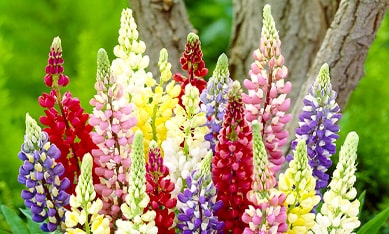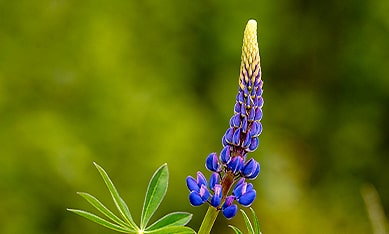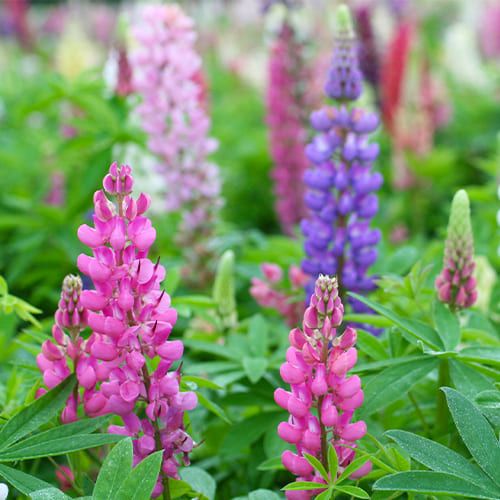Lupinus (Narrowleaf Lupin)
Lupinus (Narrowleaf Lupin)
Last Reviews
Discover the Beauty of Lupinus (Narrowleaf Lupin)
Lupinus, commonly known as lupines or lupins, are stunning perennial plants that belong to the legume family, Fabaceae. These colorful blooms are prized for their vibrant spikes of pea-like flowers that adorn gardens and landscapes, adding a pop of color and attracting pollinators like bees and butterflies.
How to Choose the Best Lupinus Plants for Sale
When selecting lupinus plants for sale for your garden, consider the various types and varieties available. Lupinus come in a wide range of colors, including shades of blue, purple, pink, yellow, and white, so choose a variety that complements your garden's color scheme. Look for healthy plants with strong stems and lush foliage to ensure optimal growth and blooming potential. If you like this plant, we suggest you also check out Monarda.
Types and Varieties of Lupinus

- Lupinus Polyphyllus: Also known as the bigleaf lupine, this variety features large, palmate leaves and tall spikes of colorful flowers in shades of blue, purple, pink, and white.
- Lupinus Perennis: Native to North America, the wild lupine produces stunning blue flowers and is an important host plant for butterflies, including the endangered Karner blue butterfly.
- Lupinus Arboreus: Commonly known as tree lupin, this variety is characterized by its woody stems and fragrant, yellow flowers that bloom in late spring to early summer.
- Lupinus Texensis: Native to Texas and surrounding regions, this species boasts vibrant pink to reddish-purple flowers and thrives in hot, sunny conditions.
Explore Different Uses of Lupinus
Lupinus, revered for its ornamental beauty, boasts a rich history and offers a myriad of uses beyond its aesthetic appeal:
- Culinary Delights: Lupini beans are rich in protein, fiber, and essential nutrients, making them a nutritious addition to soups, stews, salads, and other culinary creations. In Mediterranean countries like Italy, lupini beans are often brined or pickled to remove bitterness and enjoyed as a savory snack or appetizer.
- Medicinal Purposes: In traditional herbal medicine, certain species of lupinus have been used for their purported medicinal properties. Lupinus species contain compounds such as alkaloids, flavonoids, and saponins, which have been studied for their potential antioxidant, anti-inflammatory, and antimicrobial effects.
- Soil Improvement: As part of crop rotation systems, lupinus species, such as lupinus angustifolius and lupinus albus, are used as green manure cover crops to replenish soil nutrients, suppress weeds, and improve soil structure.
Growing Lupinus: Planting and Care
When it comes to planting and caring for Lupinus, proper attention to detail can ensure healthy growth and prolific blooming.With proper planting and care, Lupinus plants will reward gardeners with vibrant blooms and lush foliage throughout the growing season.
Preparing the Soil for Lupinus
Before planting dutch lupinus, ensure that the soil is well-drained and slightly acidic to neutral pH. Incorporate organic matter such as compost or well-rotted manure to improve soil fertility and structure. Avoid heavy clay soils, as they can cause waterlogging and root rot.
Planting Lupinus Bulbs
Plant these Netherlands bulbs in early spring or fall, spacing them 12 to 18 inches apart to allow for adequate air circulation. Dig a hole slightly larger than the bulb size and place the bulb with the pointed end facing upwards. Backfill the hole with soil and water thoroughly to settle the roots in place.
Caring for Your Lupinus
Water lupinus plants regularly, especially during periods of drought, to keep the soil evenly moist. Apply a layer of mulch around the base of the plants to retain moisture and suppress weed growth. Deadhead faded flowers to promote continuous blooming and remove any damaged or diseased foliage promptly to prevent the spread of pests and diseases.

Tips for Extending the Blooming Season of Lupinus
1. Deadhead spent flowers regularly to encourage the plant to produce new blooms.
2. Apply a balanced fertilizer formulated for flowering plants in early spring to promote healthy growth and abundant flowering.
3. Provide adequate sunlight exposure, as lupinus thrive in full sun to partial shade conditions.
4. Mulch around the base of the plants to conserve soil moisture and regulate soil temperature, which can help prolong the blooming season.
Buy Lupinus from Holland
For high-quality lupinus plants, look no further than our online store. We offer a wide selection of lupinus varieties sourced from reputable growers in Holland, renowned for their superior quality and vibrant blooms. Buy lupinus bulbs today and add a burst of color to your garden!
Order Lupinus Today
Don't wait any longer to enhance your garden with the beauty of lupinus. Order your favorite varieties from our online store Dutch-bulbs.com today and enjoy their stunning blooms all season long. With our convenient ordering process and fast shipping, transforming your garden with lupinus has never been easier.













